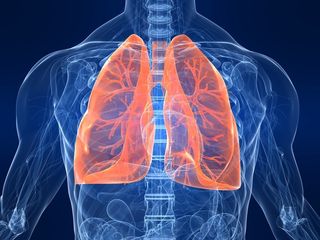Can Smokers Lungs Turn Pink Again
Do Smokers' Lungs Heal After They Quit?

Cigarette fume can have wide-ranging health effects on the body, and the lungs and airways are two of the hardest-hit areas.
But the adept news is that after a person quits smoking, the lungs can heal to a certain extent, said Dr. Norman Edelman, a senior scientific advisor for the American Lung Association and a specialist in pulmonary medicine.
As soon equally a person inhales the chemicals plant in cigarette smoke, the lung's delicate lining becomes inflamed and irritated. For several hours afterward the individual smoked, the tiny hairs called cilia that line the lungs slow downward their brush-similar movement. This causes them to go temporarily paralyzed and less effective at cleaning out mucus and other substances, such as grit particles, from the airways.
Another modify observed in the lungs of smokers is an increase in the thickness and production of fungus. Because cilia cannot sweep fungus out of the lungs equally rapidly as information technology's being formed, it accumulates in the airways, clogs them upward and triggers a cough. A buildup of mucus can also cause more than lung infections, such every bit chronic bronchitis. [Kick the Habit: x Scientific Quit-Smoking Tips]
How lungs heal
Generally speaking, some of the curt-term inflammatory changes to the lungs tin be reversed when people quit smoking, Edelman said. In other words, swelling subsides on the surface of the lungs and airways, and lung cells produce less mucus, he said. New cilia tin can grow, and these are better at clearing out mucus secretions, he added.
In the days to weeks after quitting, former smokers will notice that they accept less shortness of breath when they do, Edelman told Live Science. It's not exactly clear why this happens, merely role of information technology stems from getting carbon monoxide out of the claret, he said. This gas found in cigarette smoke can interfere with the transport of oxygen, considering carbon monoxide binds to carmine blood cells in identify of oxygen. This may account for the breathlessness some smokers experience.
Another reason former smokers have improved animate is because the inflammation decreases in the lining of their airways; this happens because the lining is no longer exposed to smoke'southward chemical irritants, Edelman said. This reduced swelling makes more than room for air to flow through the passageways.
Paradoxically, old smokers may cough more than during the first few weeks after they quit than when they were smoking. Merely this is a expert affair; it means the lung's cilia are agile again, and these fine hairs can at present move excess mucus secretions from the lungs into the airways and toward the throat, where they can be coughed upwardly, Edelman said.
"Coughing is cleaning up the gunk in the lungs," Edelman explained.
Another health do good of quitting is a reduced risk for lung cancer, he said. The longer that former smokers go without lighting up, the lower their take chances of getting this cancer, although the risk never completely goes away, Edelman said.
For instance, 10 years after quitting smoking, a former smoker's odds of getting lung cancer are about half that of a smoker, co-ordinate to the Centers for Disease Control and Prevention. But an ex-smoker is even so more likely to die of lung cancer than someone who has never smoked.
Not all changes are reversible
The body is very good at repairing some of the damage to lung cells and tissues caused by smoking, but not all of the damage is reversible.
Damage to the lungs and a deterioration in lung function are directly related to the number of packs of cigarettes a person typically smokes per day times the number of years the person has smoked, a measure known equally "pack years," Edelman said. The greater the pack years, the more than probable the lungs volition have irreversible impairment, he noted.
Although the lungs take means to protect themselves from damage, these defenses are reduced with long-term exposure to the harmful chemicals inhaled from cigarettes. Every bit a result, lung tissue tin get inflamed and scarred from smoking, so the lungs lose elasticity and can no longer commutation oxygen efficiently.
Long-term smoking tin atomic number 82 to emphysema, a type of chronic obstructive pulmonary disease (COPD). This condition destroys a portion of the lungs known equally the alveoli, which is where the exchange of oxygen and carbon dioxide takes place, Edelman said. People with COPD accept shortness of breath and difficulty breathing.
In one case a person's lungs are damaged to the point of emphysema, the walls of the airways lose their shape and elasticity, making it difficult to button all the air out of the lungs. These lung changes are permanent and irreversible, Edelman said
Using MRI imaging, scientists have recently learned that the damage to airways linked with emphysema begins a few years after a person starts smoking, although symptoms of the disease may not show up until xx to 30 years down the road, Edelman said.
Only information technology'south never besides late to quit smoking, and quitting at any age can help people exhale better and increment their life expectancy, Edelman said.
Originally published on Alive Science .
Source: https://www.livescience.com/59667-quit-smoking-lungs-heal.html
0 Response to "Can Smokers Lungs Turn Pink Again"
Postar um comentário